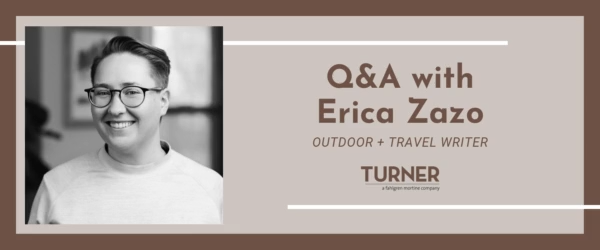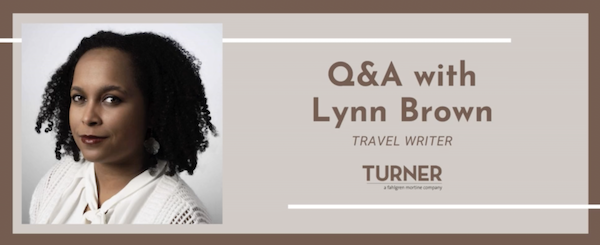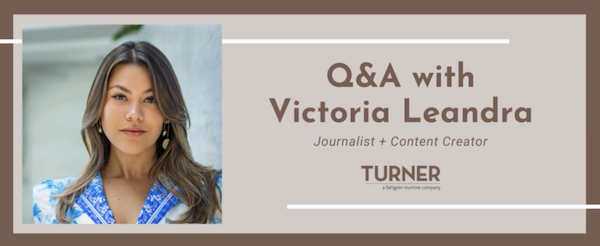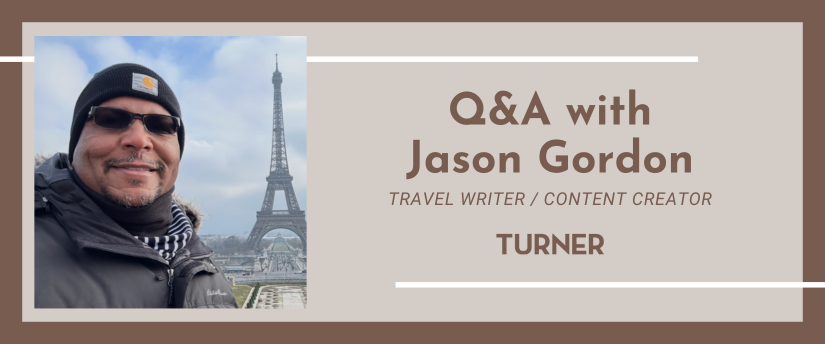TURNER Q&A: Lynn Brown
Lynn Brown is a writer, professor, digital storyteller and traveler whose work centers on issues of race, place, culture and history. Currently the...

Based in Chicago, Erica Zazo is a freelance writer with a deep-seated passion for uncovering the hidden gems of the Midwest, with an emphasis on inclusivity in the great outdoors. A frequent contributor to renowned publications like Backpacker Magazine, CNN Underscored, her insights extend to niche outdoor voices such as Hatch and Block Club Chicago, as well as her own Staying Curious Substack newsletter. TURNER hopped on Zoom recently to get Erica's thoughts on where the outdoor industry has been and where it’s headed.
I have a journalism degree from Michigan State University with a minor in public relations — and I went right into PR after graduation, not knowing that becoming an outdoor journalist would be in my future. I actually didn't fall in love with the outdoors until the end of my college career. After several sports injuries — three ACL tears! — I figured it was my time to step off the field (and ice rink) and into nature instead. I started to really get into hiking and camping after graduation. Right around that time, I saw that Backpacker Magazine was looking for writers to cover trail stories. I had just relocated to Texas, and they didn’t have any writers in that region, and I realized: “Oh, maybe I could write about the outdoors outside of my day job as a PR person?!” After a few years, I built up enough of a rapport with editors as an outdoors writer that I thought I could make the jump and do this full-time. It was a slow build.
I think there's always been a stigma around the outdoor experience, where getting outdoors must look like it does out in the rural mountain West — where you're summiting mountains or ripping down the biggest hill you can find on your mountain bike. But growing up in urban areas, and now living in Chicago, I've started to see that you can have outdoor experiences that don't look like the status quo — and don't look like what media has traditionally written about. When COVID came around people wanted to get outside in their own areas, so the outdoor industry started taking a different look at what that whole experience looks like. It could be as simple as a walk in your neighborhood or planning an outdoor trip within the region that you live. And it's not that people haven't always been doing that or that people haven’t lived in cities forever. It's just that COVID woke people up to looking at outdoor experiences in a new light and realizing the outdoors can mean something different for everyone.
My work has always revolved around telling lesser-known outdoor stories, whether that’s writing about obscure hiking trails in Oklahoma or writing about urban trails you can find right in Chicago's backyard. Living in the Midwest, there are fewer outdoor journalists; that could be because the industry has traditionally ignored these quote-unquote less outdoorsy locations. So, I like to lean into my identity as a Midwesterner who loves exploring my own city’s nature. I've built a portfolio of work that has allowed me to travel all over the country and across the globe, looking for outdoor experiences that are outside of our national parks and more in small towns or even in urban spaces. Sometimes it can be challenging to go to a national park, where there's so many people flooding the trails or these resort destinations where you're in a sea of other travelers. I want to help people find those lesser traveled and lesser experienced outdoor destinations.
Personally, I don’t like it when folks want to gatekeep information about these hidden gem-type places. I think everyone should have the freedom to explore. As an outdoor journalist, I have a responsibility to educate people and help them find any sort of experience they’re looking for — and that includes the lesser-known spots. There can be a toxic stigma around sharing information. I’m hoping to break that mold with my work.

Photo: Andy Cochrane
In outdoor and travel writing, storytelling starts with the voice of journalists who’ve experienced the outdoor destinations for themselves. In my opinion, tourism destinations should make an effort to invite a diverse mix of journalists from different backgrounds and world views to share their unique stories and experiences following a visit. Destinations should also have resources ready to go to make the journalist feel more welcome and supported in their discovery of diversity-related stories while traveling.
For example, if a destination is inviting me out — a queer outdoor journalist — they should have a list of LGBTQ-friendly experiences, queer-owned businesses, or even a local representative from the destination willing to share itineraries related to LGBTQ experiences in town. Destinations can’t just be like, “Hey, gay traveler, come here and then write about it,” you know?
Quite honestly, there are very few destinations that have a list of LGBTQ-owned businesses or connections with, say, a person in town on the city council who happens to be gay. It’s surprising to me when destinations want me to come visit and don’t already have that info. Destinations should educate the locals who are advocates; they should be encouraged to put up signage that is inclusive.
At the end of the day: You can’t say you’re a supportive, inclusive place, but not have resources and visual queues of that diversity reflected in the community. By doing so, it can come across as a false marketing message. What do you think is going to happen when queer travelers or travelers of color visit, and they can’t find anything that makes them feel welcome?
Another improvement I’d like to see is that the outdoor industry specifically has pigeonholed queer writers and writers of color, basically saying that they can only write about the challenges that we’ve dealt with. It’s like we’re being told what types of stories we’re allowed to write. It would be great to have writers who happen to queer or who happen to be people of color get opportunities to experience things that don’t necessarily tie back to their identity.
The Midwest is such a great road trip destination. You can use our big cities as a launching point for more adventure. That goes back to the urban adventure piece; you might fly into Milwaukee, Madison, Omaha, or Chicago, and then rent a car and explore smaller places within an hour or two.
It’s not so much a pet peeve, but I do love for PR people to follow me online. I’m sure many PR folks have Instagram! In an ideal world, you’re following my Instagram and engaging with me outside of pitching. Then, we get to know eachother outside of email, follow each other’s travels and personal lives, and more generally see eachother as the humans we are. Building a relationship on a mutual understanding of what we all do outside of work is always a good thing.
I’d also encourage PR people to understand the difference between a freelancer and a staff writer. I’ve always been a freelancer and the way we work is so different from a staff writer. Freelancers don’t have a lot of control over where our future stories will land, what editor relationships may change in the future, or where our next opportunity to write for a new magazine or online publication will be. I have such a hard time telling you where I’m going to be writing in the next three months as the media space is so volatile and I have to keep many publication relationships active at one time. A better way to approach working with freelancers is to be strategic; if you have a vision for where a story could land and you’re working with a freelancer, approach us and ask where you’re hoping we pitch a story. If you know that I frequently write for a specific publication, pitch me for that specific publication! When you leave it all up to us to figure that out, it can become a hassle and less likely for us to both see a “win.”
Follow Erica's further adventures on Instagram and Substack.

Lynn Brown is a writer, professor, digital storyteller and traveler whose work centers on issues of race, place, culture and history. Currently the...

An award-winning journalist, Victoria Leandra works at the intersection of social justice, travel, food and culture. She’s been noted by some big...

Driven by a deep-seated love for exploration, Jason Gordon has become a highly respected voice in the travel world and the cruise industry. As a...